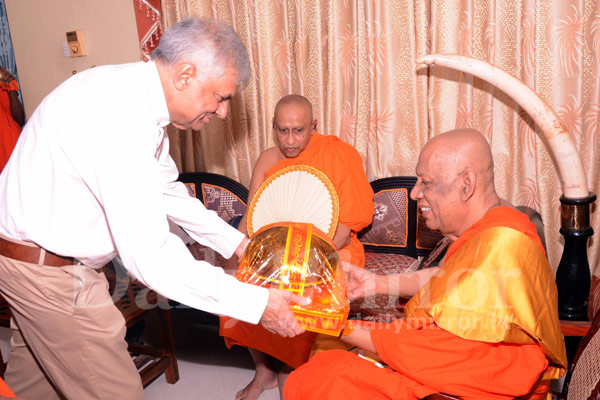
Prime Minister Ranil WIckremesinghe at a ceremony in March 2017 where his credentials are presented to a newly appointed chief Buddhist prelate. Photograph:dailymirror.lk
Sri Lanka’s Prime Minister Ranil Wickremesinghe marked 40 years as a Member of Parliament last week.
Having entered parliament in 1977, Mr Wickremesinghe was appointed Deputy Minister of Foreign Affairs in the United National Party (UNP) government of the time and swiftly appointed, by then president JR Jeyawardena, as a cabinet minister in subsequent years. In an infamous interview to the Daily Telegraph, two weeks before anti-Tamil pogroms and massacres swept the island in 1983, Jeywardena said,
“I am not worried about the opinion of the Jaffna (Tamil) people now. Now we cannot think of them. Not about their lives or of their opinion about us. The more you put pressure in the north, the happier the Sinhala people will be here... really, if I starve the Tamils, Sinhala people will be happy.”
Mr Wickremesinghe then served as Sri Lanka’s Prime Minister from 1993-1994 and 2001-2004, with his current tenure as prime minister beginning in 2015.
His second tenure as prime minister from 1993-1994 saw at least 145 Tamil civilians killed, with impunity, in a series of massacres by the Sri Lankan state’s army and navy.
During his tenure from 2001-2004 Mr Wickremesinghe became an instrumental figure in Sri Lanka’s Cease Fire Agreement (CFA) with the Liberation Tamil Tigers of Tamil Eelam (LTTE) and following peace-talks process. He received criticism from analysts on both sides of the conflict as well as Sinhala nationalist organisations. Analysts at the time noted that Mr Wickremesinghe’s foreign policy was also geared towards alienating the negotiating party (LTTE) from the international community whilst engaging in peace talks with the organisation. His foreign policy during the peace-talks saw the LTTE internationally prescribed as a terrorist organisation for the first time and secured significant international defence deals to strengthen the Sri Lanka’s Army, Navy and Air Force. These deals also saw Sri Lanka acquire stockhold of, now internationally banned, cluster bombs.
The current tenure of Mr Ranil Wickremesinghe has seen him navigate the process of dealing with increasing pressure from the international community to provide justice, accountability and genuine reconciliation for the mass atrocities committed by the state against Tamil civilians. In 2015 Mr Wickremesinghe’s government, amidst heightening international pressure, co-sponsored a United Nations Human Rights Council that called for a justice process that included foreign judges, investigators and prosecutors. Though the co-sponsoring of the resolution was a move welcomed by analysts and the international community, Mr Wickremesinghe has faced heightening criticism over his subsequent public reneging on commitments made in the UN resolution and rejection of foreign participation in a credible justice process. Most recently Mr Wickremesinghe appointed a committee to oversee the UN resolution which included a majority of ministers that were historically opposed to the UN resolution. Mr Wickremesinghe's committee to ovesee the implimentation of the resolution also omitted Minister Mangala Samraweera, a pivotal figure that international diplomats used as a point of contact to ensure Sri Lanka’s co-operation and commitment to a credible accountability, justice and reconciliation process.
